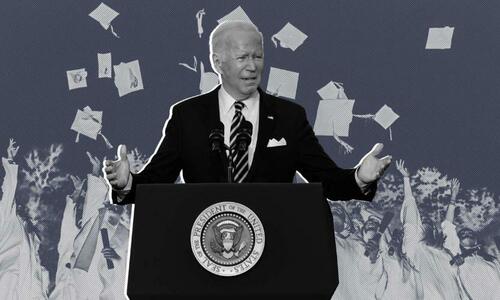Washington Post: Yes, The Biden Loan Forgiveness May Be Unconstitutional But…
The Washington Post is now admitting that President Joe Biden’s college loan forgiveness plan is unconstitutional, but it insists that the “the court shouldn’t stop him.”
The reason is standing and the Post is now apparently a standing hawk forced to accept a half trillion dollar give-away to maintain a narrow view of case or controversies under Article III.
The Post previously ran opinion pieces saying that Biden clearly has this authority, but this is an opinion piece from the editors themselves on the subject.
The Post now admits with some of us that Biden “overreached” in his use of the HEROES Act to allow him to unilaterally cancel roughly 500 billion dollars in loan debts. Executive “overreach” is a common reference to exceeding the authority afforded by Article II. The Post describes the action as “bad” and without congressional approval. Of course, giving away half a trillion dollars without congressional approval was the type of unilateral action that the Framers sought to prevent in giving Congress the power of the pursue. In other words, it is not just “bad.” It is unconstitutional.
President Biden is using a law designed to help service members and their families deal with debt accrued in fighting for this country.
The terms of the Higher Education Relief Opportunities for Students (HEROES) Act of 2003 allows the secretary of education “to waive or modify … financial assistance program requirements … affected by a war, other military operation, or national emergency.” Biden had promised to wipe out tuition debt in the campaign and simply hijacked the Act for that unintended purpose. Putting that aside, the Act ties such relief to an inability to cover such costs due to the war or emergency.
The Biden plan would use the law to benefit individuals without such a showing, including many of the 40 million beneficiaries who are relatively wealthy and could pay off the loans.
Various professors including Dalié Jiménez, a law professor at the University of California, Irvine, filed an amicus brief in support of the Administration and claimed that the HEROES Act “is as clear as sunlight” in authorizing the department’s action.
The Office of Legal Counsel, considered the ultimate authority on legal interpretations in the Executive Branch, looked at this issue during the Trump administration. Its memo concluded that “the Secretary does not have statutory authority to provide blanket or mass cancellation, compromise, discharge, or forgiveness of student loan principal balances, and/or to materially modify the repayment amounts or terms thereof, whether due to the COVID-19 pandemic or for any other reason.”
The Biden Office of Legal Counsel issued a new opinion concluding the opposite, due to the ongoing pandemic — a curious argument, since the Biden administration was just in court arguing that the pandemic was effectively over, in order to allow undocumented individuals to enter the country. Citing the Centers for Disease Control and Prevention, the administration sought to stop the enforcement of Title 42, which allowed the government to turn away migrants at the border.
Now, the Post appears to reject the Biden OLC opinion and calls the policy not only unconstitutional “overreach” but “a regressive and expensive mistake.”
It insists, however, that this unconstitutional, regressive and expensive overreach should stand.
I should admit that I have been described as a “standing dove” due to my more liberal view of standing requirements under Article III. I successfully argued in favor of standing for the House of Representatives as a single house and previously argued (unsuccessfully) on behalf of individual Democratic and Republican members seeking “members standing.” I view narrow standing rules as often inimical to the protection of core structural guarantees of the Constitution.
This case is precisely why I have long favored broader standing rules. This is a clearly unconstitutional action by the President that is being defended largely on the basis of, in my view, an unnecessarily narrow view of standing imposed by the courts.
I recently spoke at the University of Maryland with George Mason law professor Ilya Somin, who argues that the claims of Missouri satisfy standing.
At issue is the right of the state to argue the interests of the the Missouri Higher Education Loan Authority (MOHELA) – that services student loans. While MOHELA is an independent agency and is not a party to the lawsuit, Somin argues that detractors confuse this case with prior cases raising individual constitutional injuries: “Unlike individual rights claims, which – on this theory – can only be asserted by people who have suffered specific rights violations, structural claims can be raised by anyone, because structural restrictions on government power provide generalized protection for all Americans.” He believes that standing can be based on existing precedent.
There is a legitimate issue over standing under current case law. It ultimately turns on one’s views on the proper scope of the standing doctrine in raising these structural constitutional concerns. However, the Post, which has previously shown a tendency toward broad interpretations of constitutional provisions, may be premature in citing standing (albeit reluctantly) as a shield for this clearly unconstitutional overreach by President Biden.
Tyler Durden
Sun, 03/05/2023 – 12:30
via ZeroHedge News https://ift.tt/7G2uaJw Tyler Durden
